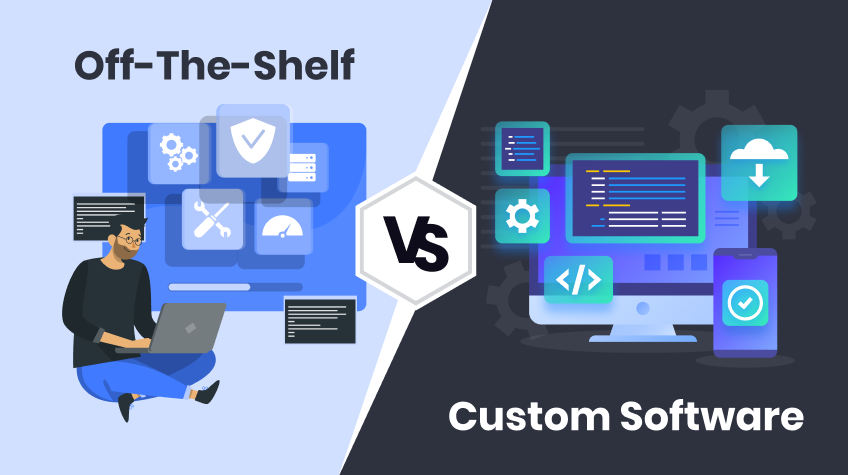In today’s rapidly evolving digital landscape, businesses face a critical decision when it comes to their software needs: should they invest in a bespoke, custom software development solution or opt for a readily available, off-the-shelf product? This isn’t a one-size-fits-all answer, and getting it wrong can lead to significant financial waste and operational inefficiencies. This blog will explore a decision framework to help businesses navigate this crucial choice.
Understanding the Core Differences
At its heart, the distinction is about tailor-made versus ready-made.
- Off-the-Shelf Software: These are pre-built applications designed for a broad market, addressing common business needs like CRM, accounting, or project management. Think of popular tools you might already use.
- Pros: Lower initial cost, faster deployment, immediate accessibility, established support communities, and regular updates from the vendor. They’re often ideal for standard processes that don’t offer a significant competitive edge.
- Cons: Limited customization, potential “feature bloat” with unnecessary functionalities, reliance on vendor roadmaps, and potential difficulty integrating with unique existing systems.
- Custom Software: This refers to software built from the ground up to meet the precise, unique requirements of a specific business.
- Pros: Perfect fit for your unique workflows, competitive advantage through proprietary functionality, seamless integration with existing systems, enhanced security tailored to your needs, and complete ownership and control over the software’s evolution. It can provide long-term cost-effectiveness by streamlining highly specific operations.
- Cons: Higher upfront development costs, longer development and deployment times, and the need for ongoing maintenance and support (either in-house or outsourced).
The Decision Framework: Key Considerations
To make an informed choice, consider these factors:
- Unique Business Needs and Workflows:
- Are your business processes standard or highly unique? If your operations align closely with industry best practices and can be efficiently managed by existing software, off-the-shelf is likely suitable. However, if your business has proprietary workflows, niche requirements, or a desire to gain a significant competitive edge through technology, custom software development becomes compelling. Trying to force unique processes into generic software often leads to workarounds and inefficiencies.
- Budget and Timeframe:
- What is your immediate budget and long-term financial plan? Off-the-shelf software generally has lower initial costs and quicker implementation. Custom solutions demand a more substantial upfront investment and a longer development cycle. However, consider the total cost of ownership (TCO) over time. Licensing fees, unneeded features, and workarounds for off-the-shelf solutions can accumulate, making custom softwaremore cost-effective in the long run for complex needs.
- How quickly do you need a solution? If immediate deployment is paramount, off-the-shelf is the clear winner. If you have the time to invest in a solution that will perfectly serve your business for years to come, custom development is a viable path.
- Scalability and Future Growth:
- How will your software needs evolve as your business grows? Off-the-shelf solutions can sometimes have limitations on scalability or may require expensive upgrades as your business expands. Custom software is built with your future growth in mind, allowing for seamless adaptation and expansion of features and user capacity.
- Integration Requirements:
- Does the new software need to integrate seamlessly with existing systems? Off-the-shelf products can sometimes struggle with complex integrations, leading to data silos and manual data transfers. Custom software, by its very nature, can be designed to integrate perfectly with your current technology stack, ensuring a cohesive and efficient ecosystem.
- Competitive Advantage:
- Is the software a core part of your competitive strategy? If the software you’re considering directly contributes to a unique value proposition or helps you outperform competitors, then custom development is often the way to go. It allows you to embed your unique intellectual property and processes directly into the technology. For instance, if you’re a leading software development company aiming to offer a truly innovative service, a custom solution will set you apart.
- Internal Resources and Expertise:
- Do you have the in-house technical talent to manage and maintain software? Off-the-shelf solutions typically come with vendor support. Custom software requires ongoing maintenance, bug fixes, and updates. You’ll either need an in-house team or a reliable external partner, like a custom software development company in Dubai.
Also read : Unlocking the Power of Communication: NLP in Software Development
Finding the Right Partner
If your decision framework points towards a custom solution, choosing the right development partner is crucial. Look for experienced and reputable custom software development companies in Dubai that understand your industry, have a proven track record, and prioritize clear communication and transparency throughout the development process. The top software development company in Dubai will offer not just coding expertise, but also strategic guidance and long-term support. Finding the best software development company in Dubai for your specific project will ensure your investment yields maximum returns.
Conclusion
The “build vs. buy” decision is strategic for any business. By carefully evaluating your unique needs, budget, timeline, scalability requirements, integration demands, and competitive goals, you can arrive at the solution that best empowers your business for sustainable growth. Whether it’s the immediate utility of off-the-shelf software or the tailored precision of a custom build, a well-thought-out decision is the foundation for technological success.




